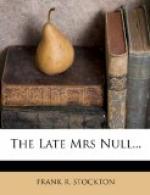At this passage, Annie, who was reading the letter aloud, and Lawrence who was listening, both laughed. But they made no remarks, and the reading proceeded.
Junius next alluded to the news of his cousin’s engagement to Mr Croft. His guarded remarks on this subject showed the kindness of his heart. He did not allude to the suddenness of the engagement, nor to the very peculiar events that had so recently preceded it; but reading between the lines, both Annie and Lawrence thought that the writer had probably given these points a good deal of consideration. In a general way, however, it was impossible for him to see any objection to such a match for his cousin, and this was the impression he endeavored to give in a very kindly way, in his congratulations. But, even here, there seemed to be indications of a hope, on the part of the writer, that Mr Croft would not see fit to make another short tack in his course of love.
Like the polite gentleman he was, Mr Keswick allowed his own affairs to come in at the end of the letter. Here he informed his cousin that his engagement with Miss March had been renewed, and that they were to be married shortly after Christmas. As it must have been very plain to those who were present when Miss March left his aunt’s house, that she left in anger with him, he felt impelled to say that he had explained to her the course of action to which she had taken exception, and although she had not admitted that that course had been a justifiable one, she had forgiven him. He wished also to say at this point that he, himself, was not at all proud of what he had done.
“That was intended for me,” interrupted Lawrence.
“Well, if you understand it, it is all right,” said Annie.
Junius went on to say that the renewal of his engagement was due, in great part, to Miss March’s visit to his aunt; and to a letter she had received from her. A few days of intercourse with Mrs Keswick, whom she had never before seen, and the tenor and purpose of that letter, had persuaded Miss March that his aunt was a person whose mind had passed into a condition when its opposition or its action ought not to be considered by persons who were intent upon their own welfare. His own arrival at Midbranch, at this juncture, had resulted in the happy renewal of their engagement.




